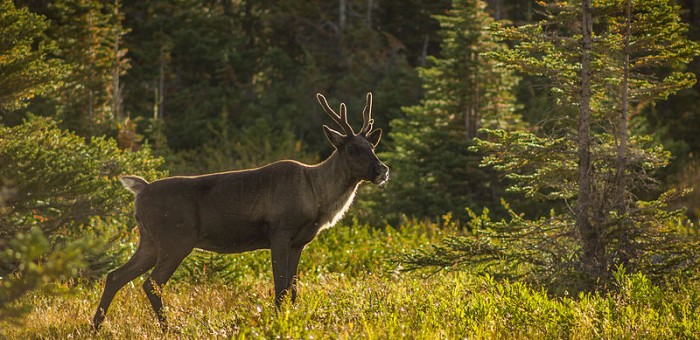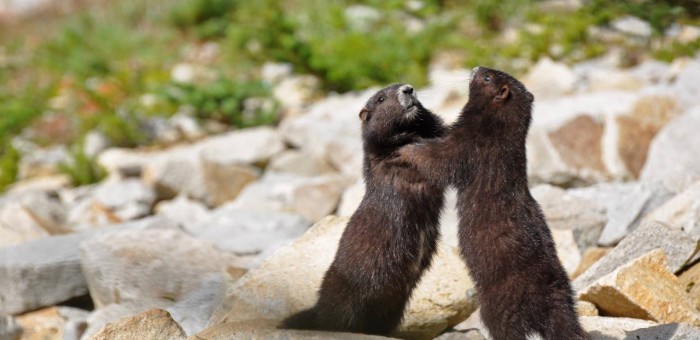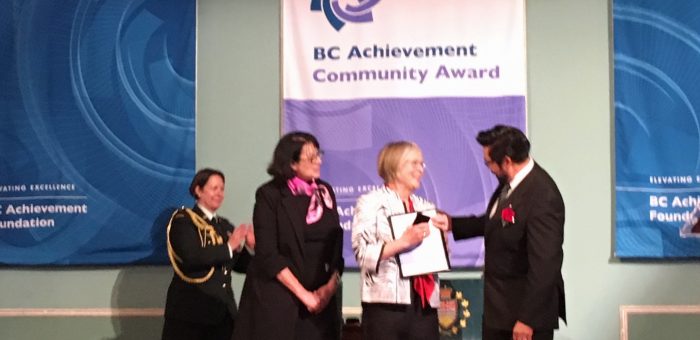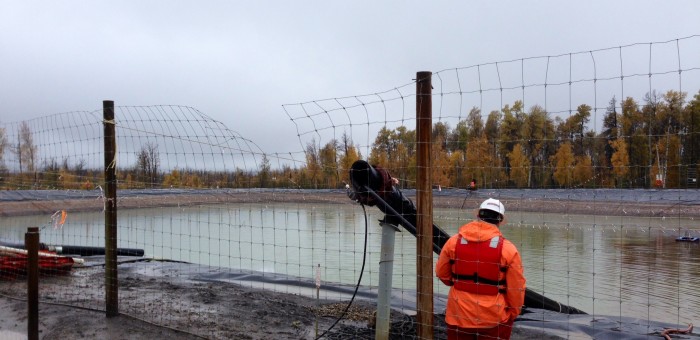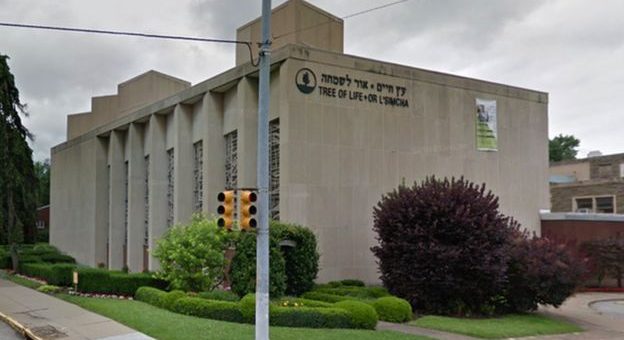Issues & Community Blog - Andrew Weaver: A Climate for Hope - Page 24
On the decline of BC’s caribou and old growth forests
Today in the legislature I rose during Question Period to ask the Minister of Forests, Lands and Natural Resource Operations two distinct questions. In the first, I asked how he reconciles his Ministry’s efforts to preserved at-risk caribou herds while at the same time issuing more hunting permits for the same caribou. In the second question I ask him what he plans to do to preserve the last remaining old growth valley-bottoms on Vancouver Island.
Below I reproduce the text and video of our exchange.
Video of Exchange
Question
A. Weaver: I’ve just been walking around with a smile on my face today from ear to ear, and I continue to ask that question in that spirit.
There are 54 caribou herds in British Columbia, 30 of which are at risk of extirpation. Fourteen have less than 25 animals, and the B.C. Government website lists that one of these herds has precisely one individual, whereas another has three. Since the information was posted on the site, it’s likely that they’re gone as well.
British Columbia’s caribou herds are in crisis, and scientists have been raising the alarm for many, many years. After nearly managing the species into oblivion, we’re now desperately trying to save them by any means possible. Yet, at the same time as we try to avoid extirpation in one area, in a neighbouring area, the government issues and permits a legal caribou hunt.
To the Minister of Forests, Lands, and Natural Resource Operations: aside from the First Nations’ food, social and ceremonial hunt, how many caribou is he permitting to be hunted in British Columbia in the 2019-2020 limited area hunt and general open season in management units 617 to 620 and 622 to 627?
Answer
Hon. D. Donaldson: Thank you to the Leader of the Third Party for the question to talk about an important animal, an iconic species in B.C. and across Canada and internationally. That is the caribou.
I think it’s been pointed out already in question period so far that unlike the old government, we take the decline in caribou populations very seriously. Going back to 2003, the previous government ignored calls for action to protect caribou habitat for over a decade and kept in place a patchwork of measures that don’t meet federal standards, putting jobs at risk and caribou at risk.
As far as the hunting of caribou that the member asked about, we know that the Chase, Wolverine and Itch-Ilgachuz herds are classified as threatened, and the herd populations continue to decline. That’s why we closed the caribou hunt for these three herds this past March, and this hunt will remain closed until further notice. There are some herds that are still available for hunting, and those are the Carcross and Atlin herds in my constituency, in the northwest corner of B.C. Both herds have in excess of 800 animals.
The member is right. When it’s based on the best available science, and when conservation is the top priority, followed by First Nations’ food spiritual and ceremonial needs, only then is hunting allowed. There are very few animals available for hunt — approximately ten.
Supplementary Question
A. Weaver: Well, that’s inconsistent with the information I have here, where it looks like 268 permits have been issued for caribou in Skeena region 6, which would be ironic in light of the fact the minister just mentioned 800-some animals in and around that area.
The point I’m making here is we’re hunting caribou while we try to save caribou. There’s no overall strategy. Caribou, as we know, are dependent on old-growth boreal and mountain economic systems. For many herds, their main food source is lichen that grows on old trees, and cutblocks and logging roads make them much more vulnerable to predators, as we all know.
Yesterday the United Nations released a landmark study reporting that over a million species are now at risk of extinction, and habitat loss is the driving factor. In B.C., we only act when it’s already too late. For example, our invaluable Vancouver Island valley-bottom old growth is globally rare and is an essential habitat for many species.
My question is again to the Minister of Forests, Lands and Natural Resource Operations. Will this government stop its Loraxian approach to resource management and step in to protect the last intact, productive valley-bottom old growth on Vancouver Island?
Answer
Well, I understand we were talking about caribou. There are no caribou on Vancouver Island. I’m sure the member knows that. As far as old-growth forests go on Vancouver Island, we’re committed to creating an old-growth plan in consultation with industry, in consultation with environmental NGOs and in consultation with communities.
We know that old-growth forests provide incredibly important habitat for biodiversity. There are over 500,000 hectares of old growth already protected on Vancouver Island through protected areas and parks. We also know that old-growth forests provide important revenue for communities and important jobs for forestry workers. We’ll continue to manage old growth in a sustainable way, and we’ll continue to work on the caribou file to protect jobs and to protect caribou.
Humans threaten one million species with extinction worldwide, B.C. still without any endangered species legislation
The Intergovernmental Science-Policy Platform on Biodiversity and Ecosystem Services (IPBES) today released its landmark assessment detailing the world’s declining state of biodiversity. Remarkably, British Columbia’s government has still not announced how it plans to deliver on its 2017 mandate to enact an endangered species law. Below I reproduced the text of our media release in response to the IPBES report.
Media Release
Humans threaten 1 million species with extinction worldwide, B.C. still without any endangered species legislation
For immediate release
May 6, 2019
VICTORIA, B.C. – One million of the planet’s eight million species are threatened with extinction, according to a comprehensive report released today from the Intergovernmental Science-Policy Platform on Biodiversity and Ecosystem Services (IPBES), a UN committee, and yet British Columbia’s government has still not announced how it plans to deliver on its 2017 mandate to enact an endangered species law.
“The report identifies habitat loss, sustainable exploitation, climate change, and pollution as the main culprits, which are all areas that we can and should focus on in British Columbia to protect our at-risk species and the health of our province,” B.C. Green Party Leader Andrew Weaver said.
“I drafted and introduced an endangered species act for British Columbia twice in the legislature, most recently in November 2017. British Columbia is the most bio-diverse province in Canada, but it is also home to more at-risk species than any other province with 1,807 species at risk of extinction. In addition to detailing policies to identify, protect and rehabilitate at-risk wildlife populations and habitats, my Endangered Species Act introduced proactive measures that would prevent healthy species from declining in the first place.”
The world is in the midst of the sixth great global extinction event, and humans are the driving force. Proactive protection and active restoration are key to the resiliency of British Columbia.
Humans are part of nature and inextricably linked to its deterioration. As stated in the IPBES report, some 70 percent of drugs used for cancer treatment are natural or synthetic products linked to nature, and 75 percent of global food crops rely on animal pollination. In B.C., in 2017 nearly 10,000 people were employed in fisheries-related jobs and other 141,000 worked in forestry-related positions.
“If our ecosystems collapse, so does our economy,” Weaver said. “We need biodiversity for pollination, flood prevention, water and air purification, climate change resiliency, and social and cultural well-being.
“The IPBES report makes it abundantly clear governments must act urgently to change the trajectory of global extinction. My B.C. Green caucus colleagues and I will fight for the same in British Columbia.”
-30-
Media contact
Macon McGinley, Press Secretary
+1 250-882-6187 |macon.mcginley@leg.bc.ca
Congratulations Margaret Lidkea, winner of a BC Achievement Community Award Recipient
The 2019 British Columbia Achievement Community award presentations took place at Government House on May 1, 2019. Margaret Lidkea, a constituent of Oak Bay-Gordon Head, was a recipient of this honour for her outstanding ecological stewardship work in our community.
In total, twenty-four British Columbians received recognition at the sixteenth annual BC Achievement Community Award presentation ceremony. The Honourable Janet Austin, OBC, Lieutenant Governor of British Columbia along with BC Achievement Foundation Board members, Robert Louie, OC and Christopher Gaze, OBC presented each recipient with a BC Achievement Community Award certificate, medallion and citation.
The British Columbia Achievement Foundation is an independent foundation established and endowed by the Province in 2003 to celebrate excellence and achievement in British Columbia. The medallion presented to each recipient is designed by Order of Canada member and B.C. artist Robert Davidson.
 Margaret Lidkea is an inspirational leader in our community, dedicated to raising public awareness of the importance of ecological restoration. A biologist and an educator, Margaret earned an education degree at the University of Victoria and studied zoology and genetics at the University of British Columbia. Margret attended Lansdowne Middle School and graduated from Victoria High School.
Margaret Lidkea is an inspirational leader in our community, dedicated to raising public awareness of the importance of ecological restoration. A biologist and an educator, Margaret earned an education degree at the University of Victoria and studied zoology and genetics at the University of British Columbia. Margret attended Lansdowne Middle School and graduated from Victoria High School.
Margaret has been an environmental educator for over 2 decades. In 2009, she co-founded the not-for-profit organization Friends Of Uplands Park after retiring from the Swan Lake Nature Sanctuary, where she worked as a Program Naturalist from 1988 until 2009.
Nominated for this award by Oak Bay Councillor Hazel Braithwaite, who noted that Margaret’s contributions to ecological restoration and education are legendary in Victoria. For over two decades, she has been one of the most visible proponents of protection and stewardship of Uplands Park in Oak Bay. A committed volunteer, Margaret works with local school boards to develop and deliver outdoor programs to ensure that children grow up with an appreciation and respect for the natural world in which they live.
Margaret’s true passion is inspiring and educating the young people in our community about their natural environment. She is well known for her work, as far back as 1993, in organizing Broom Bashes at Uplands Park with the Girl Guides, and, for her ongoing work with local schools where she shares her knowledge of the rare Garry Oak ecosystem found in Uplands Park.
During the reading of Margaret’s citation at the ceremony, it was noted that “rain or shine, Margaret is known to get muddy, scratched and bug-bitten to lead a group of volunteers or young students and smile while taking a leadership role. In protecting the environment, her enthusiastic approach in teaching hands on science has allowed children to step out of the classroom and learn about themselves and their world.”
Margaret’s students of all ages are now proud stewards of their communities, ready to preserve and protect it for generations to come. Margaret’s dedication and mentorship have been an inspiration for so many and she is highly deserving of the honour she has received.
Out of control orphan gas well growth is imposing ever increasing liability on BC
Yesterday during question period yesterday I rose to ask the Minister of Energy, Mines and Petroleum Resources questions about the ever increasing liability British Columbians are taking on as the number of orphan gas wells grows out of control. I remain deeply concerned about the Minister’s grasp of the file and profoundly troubled by the lack of substance in her answers to our questions.
Below I reproduce the video and text of our exchange
Video of Exchange
Question
A. Weaver: Yesterday my colleague from Cowichan Valley asked the Minister of Energy, Mines and Petroleum Resources how many gas wells in British Columbia are leaking, and she didn’t know. Well, here’s some information for her: out of the 134 wells in the province with confirmed gas migration — that’s leaking problems, as documented by the Oil and Gas Commission — almost half are owned by one company, the Shanghai Energy Corporation.
This company, which has strong links to the Communist Party of China, is buying up wells in our province at an alarming rate. They now own 1,128 wells, with 863 active, 184 inactive and 13 that are being decommissioned.
My question is to the Minister of Energy, Mines and Petroleum Resources: does she think that the Communist Party of China buying up stranded assets in B.C. is concerning, and does she think that the Shanghai Energy Corporation will be a good corporate citizen and clean up their activity and all their leaky wells when the time comes?
Answer
Hon. M. Mungall: We have an open marketplace for tenures and for gas wells. That means that companies from around the world are able to purchase these tenures as well as the wells and so on. They then have the duty to be good corporate citizens, no matter who they are, no matter where they come from. We have the Oil and Gas Commission, as well as this government, who is taking its role as a regulator very seriously to ensure that, again, no matter who they are, no matter where they’re from, that any corporation who’s doing business in British Columbia and business in our oil and gas sector is following the rules.
Supplementary Question
A. Weaver: I’m not sure I understood what the answer to the question was there, but nevertheless, let me try again.
Ranch Energy was one of three companies that became insolvent last year, leaving a forecasted $12.3 million deficit in the B.C. Oil and Gas Commission’s orphan reclamation fund. Currently — I know these facts are troubling to the minister — there are 310 sites designated as orphan sites, requiring further restoration. But there are 300 to 500 Ranch Energy wells that could be added to this, creating a further potential liability of $40 to $90 million.
Yesterday the minister told the chamber that things have gotten a lot better since her government was sworn in. Yet over the last two years, B.C.’s orphan well sites have increased by — get this — 48 percent. Bankrupt companies have left the province with massive cleanup bills.
Last month we heard from the Auditor General. There are more than 10,000 active wells, with a $3 billion price tag for decommissioning them. All the while, her ministry is giving massive handouts, corporate handouts. It’s not an open market. It’s a subsidized market by this government because the market would not exist in a free and open market, because it does not compete on the international scene.
What is the minister’s plan? Please, please, I beg you — no more non-answer, no more rhetoric, no more 16 years nonsense. Answer the question for a change.
What is the minister’s plan to ensure British Columbians are not on the hook for the cleanup costs of this industry? There is no excuse for not hearing an answer here.
Answer
Hon. M. Mungall: The member might recall that just over a year ago we passed legislation — it was Bill 15 at the time — to address the issue of orphaned wells. We have done a considerable amount of work. Part of that bill was to address how we are funding the orphaned well reclamation fund.
The previous government had it funded through a taxation on production. We have moved from that because that was not an effective way to fund this fund. We’ve moved away from that, and we have a liability levy so we’re actually able to get the financial resources so that we can start reclaiming the orphaned well sites.
We have a multi-year plan to reclaim all of these sites. It involves Treaty 8 First Nations, who are doing a wide array of work to do this reclamation, including having nurseries with the appropriate vegetation of native plants so that we can truly reclaim these sites and the land to the state that they need to be in for future generations
Statement on Yom HaShoah (Holocaust Memorial Day)
Today is Holocaust Memorial Day. In the legislature the Minister of Municipal Affairs and Housing rose to deliver a Ministerial Statement for which both the Member from Abbotsford West and I delivered a response. I reproduce the video and text of my remarks below. We also issued a media statement that is appended at the end.
Video of Statement
Text of Statement
A. Weaver: Today I rise to speak about Yom HaShoah. It’s a day dedicated to reflecting on the atrocities of the Holocaust and remembering those who suffered and lost their lives.
As time moves forward, each survivor that passes away emphasizes the importance of taking the time to remember. Their stories allow us to understand what happened. They allow us to reflect on our society. I’d like to thank and honour these survivors for sharing their story.
Sadly, anti-Semitism is rising in Canada. In British Columbia, we’ve seen a 127 percent increase in the number of incidents over the last year.
Greater volumes of hate are being spewed on line, often behind the masks of anonymity. Anti-hate groups are also reporting increased in-person incidents of hate.
Religious and ethnic intolerance is antithetical to the values we hold for society. The difficulty of accepting those who are different from ourselves has been a scourge on humankind throughout history. Our answer as a society must be a strong and resounding rejection of othering and hatred. We must consistently embrace our values of tolerance and liberty.
It was the deaths of people who wanted to live in an equal world that forged the society we live in today, and we cannot let their sacrifice slip away. We should use this day to remind ourselves we do not have a guarantee to our values of tolerance, freedom of religion. If we fail to defend them, we let slip the very humanity that generations have suffered to achieve.
Let us not forget the millions of Jewish people who were murdered. Let us not forget their stories. Let us not forget that there is still work to be done.
Media Statement
BC Green caucus statement on Yom HaShoah
For immediate release
May 2, 2019
VICTORIA, B.C. – Andrew Weaver, leader of the B.C. Green Party, issued the following statement in recognition of Yom HaShoah, Holocaust Remembrance Day.
“Today is dedicated to reflecting on the atrocities of the Holocaust and remembering those who suffered and lost their lives, as well as those who fought against it.”
“Religious and ethnic intolerance is antithetical to the values we hold for society. The difficulty of accepting those who are different than ourselves has been a scourge on humankind throughout history – our answer as a society must be a strong and resounding rejection of othering and hatred. We must consistently embrace values of tolerance and liberty.
“With the recent rise of antisemitism in Canada and in BC, it is even more important that we speak up against hate, and that we remember what can happen when we do not. Let us not forget the millions of people who were murdered; let us not forget their stories; let us not we forget that there is still work to be done.”
-30-
Media contact
Macon McGinley, Press Secretary
+1 250-882-6187 |macon.mcginley@leg.bc.ca

